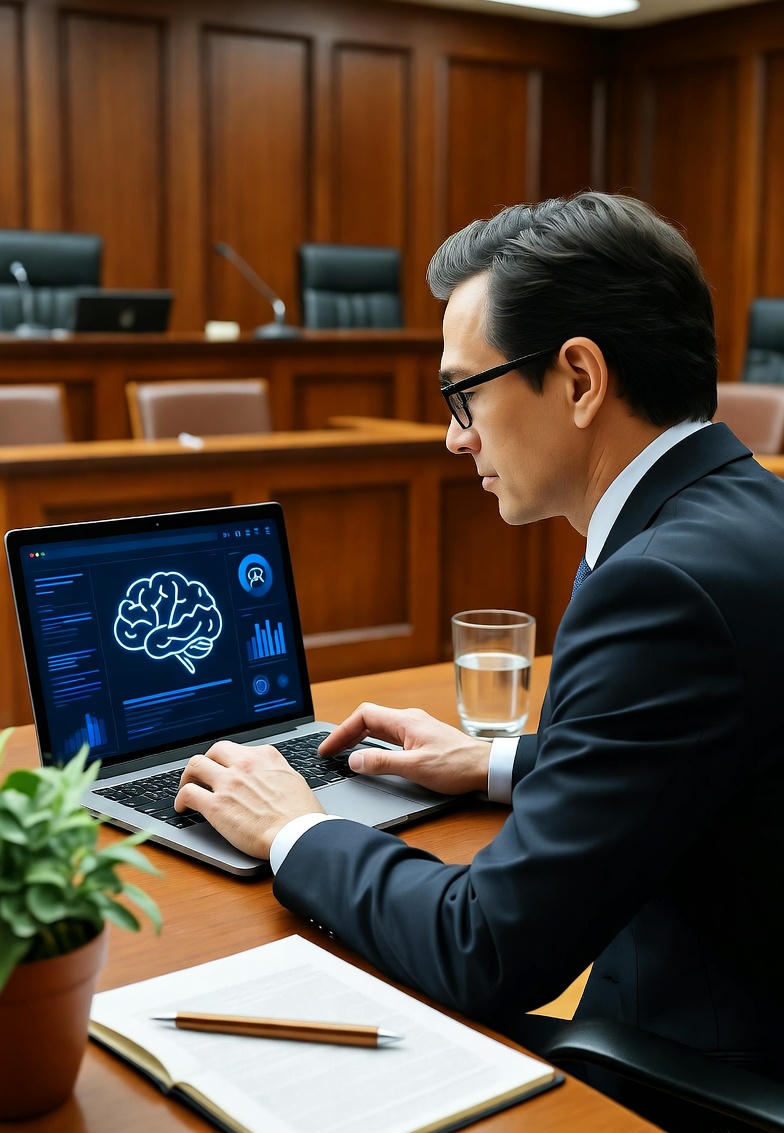TRIAL PREP: One of the myriad of use cases for AI In the Law (But does this one have a Good ROI?)
A recent Law.com article, “Grilled by a Bot: Litigators Are Turning to AI for Trial Prep”, published on October 21, 2025, by Laura Lorek, discusses the growing adoption of AI among trial lawyers for preparation tasks like mock trials, cross-examination rehearsals, and jury simulations. While highlighting benefits such as cost savings and efficiency for solo practitioners, it also raises concerns from skeptics about AI’s inability to capture human unpredictability in courtrooms.
Adjuria's Position: AI as a Strategic Enhancement for Legal Practice
At Adjuria, we advocate for the strategic integration of AI in trial preparation, positioning it as a complement to human expertise rather than a substitute. This view aligns with industry perspectives that emphasize AI’s role in amplifying lawyers’ capabilities. As noted in the article, tools like Harvey and Verdict Hub demonstrate AI’s potential to reduce preparation time and uncover strategic insights, enabling attorneys to focus on high-value judgment and advocacy.
Addressing Key Concerns: Counterarguments to AI's Limitations
The article outlines several valid concerns about AI in trial prep, including its challenges with human elements, reliance on potentially outdated data, risks of over-dependence eroding creativity, and privacy issues. However, these can be effectively mitigated through advanced, customizable AI systems, as supported by emerging legal tech analyses.
- Human Elements and Unpredictability: Critics like John Zavitsanos argue that AI pursues a “perfect truth” and fails to account for body language, emotional responses, credibility assessments, and jurors’ instincts for detecting inconsistencies. While AI cannot fully replicate these nuances, it excels at processing vast datasets to simulate realistic scenarios, identifying patterns in testimony that humans might overlook. For instance, AI can flag contradictions across depositions or predict emotional hotspots based on historical case data, allowing lawyers to prepare for “dirty truth” narratives. Moreover, in areas like oral arguments, AI can sometimes outperform humans by providing consistent, data-backed responses without fatigue or bias, freeing attorneys to handle interpersonal dynamics in real time. The key is hybrid use: AI handles the analytical heavy lifting, while humans apply empathy and improvisation, creating a synergy that enhances overall effectiveness.
- Outdated Data and Post-2021 Juror Shifts: Zavitsanos contends that pre-pandemic data is “largely worthless” due to social media-driven changes in juror behavior, making predictions unreliable. Countering this, modern AI systems can incorporate continuously updated datasets, including recent trial outcomes and social trends, even your firm’s specific cases, to model evolving demographics and conspiratorial tendencies. By integrating real-time feedback, AI adapts to these shifts, offering more accurate simulations than static traditional methods.
- Over-Reliance and Diminished Creativity: There’s a worry that heavy AI use could stifle attorneys’ skills and originality. However, when designed as a “sparring partner,” AI stimulates creativity by generating diverse counterarguments and blind spots for lawyers to refine. Studies on AI in legal contexts show it empowers data-driven innovation, allowing professionals to explore novel strategies without replacing their judgment. The article’s proponents, like Caleb Miller, echo this: AI is invaluable but not a replacement, encouraging users to maintain rigorous personal preparation.
- Privacy and Data Security: Inputting sensitive information into public platforms raises risks. This is addressed through secure, enterprise-grade AI deployments that use encryption and on-premise options, ensuring compliance with legal standards and protecting client data.
These counterarguments demonstrate that AI’s limitations are not insurmountable but rather opportunities for refinement, particularly when systems are tailored to specific firm needs.
How Adjuria's Customized Solutions Overcome Challenges
Adjuria develops bespoke AI solutions with legal domain knowledge, persistent memory, and adaptive feedback loops to directly tackle these issues. Unlike generic tools, our systems evolve through user input:
- Simulating Realistic Dynamics: Using dynamic context including recent public and private case data, our AI can model juror behaviors, emotional cues, and skepticism, bridging the “perfect truth” gap. (And this can pair with our jury consulting solutions for added punch)
- Privacy-Focused Design: Enterprise encryption and private hosting safeguard sensitive data.
- Promoting Creativity with Feedback Loops: Persistent memory retains case contexts, while integrated feedback allows firms to input actual trial outcomes—such as alignment between simulations and real juror reactions. This internalizes insights, refining the AI’s performance over time. For example, if a mock trial underestimates a venue’s conspiratorial leanings, post-trial data can train the system to adjust future predictions, making it increasingly precise and aligned with the firm’s experiences. This iterative process transforms AI from a static tool into a dynamic partner that grows with your practice.
Partner with Adjuria to Advance Your Firm's Capabilities
For litigators exploring AI for trial preparation, Adjuria provides consulting and solutions that deliver efficiency gains and strategic edges while addressing common concerns. As clients adopt AI internally, firms must evolve to stay competitive.
Explore more on legal AI in our news section at https://adjuria.com/news/.
To learn how Adjuria can tailor AI trial prep for your practice, visit our contact page at https://adjuria.com/contact/ for a consultation.
#AIinLaw #LegalTech #AITrialPrep #FutureOfLaw #ArtificialIntelligence #AIStrategy #LegalConsulting #Adjuria #AIRevolution


0 Comments